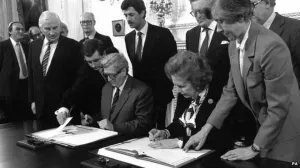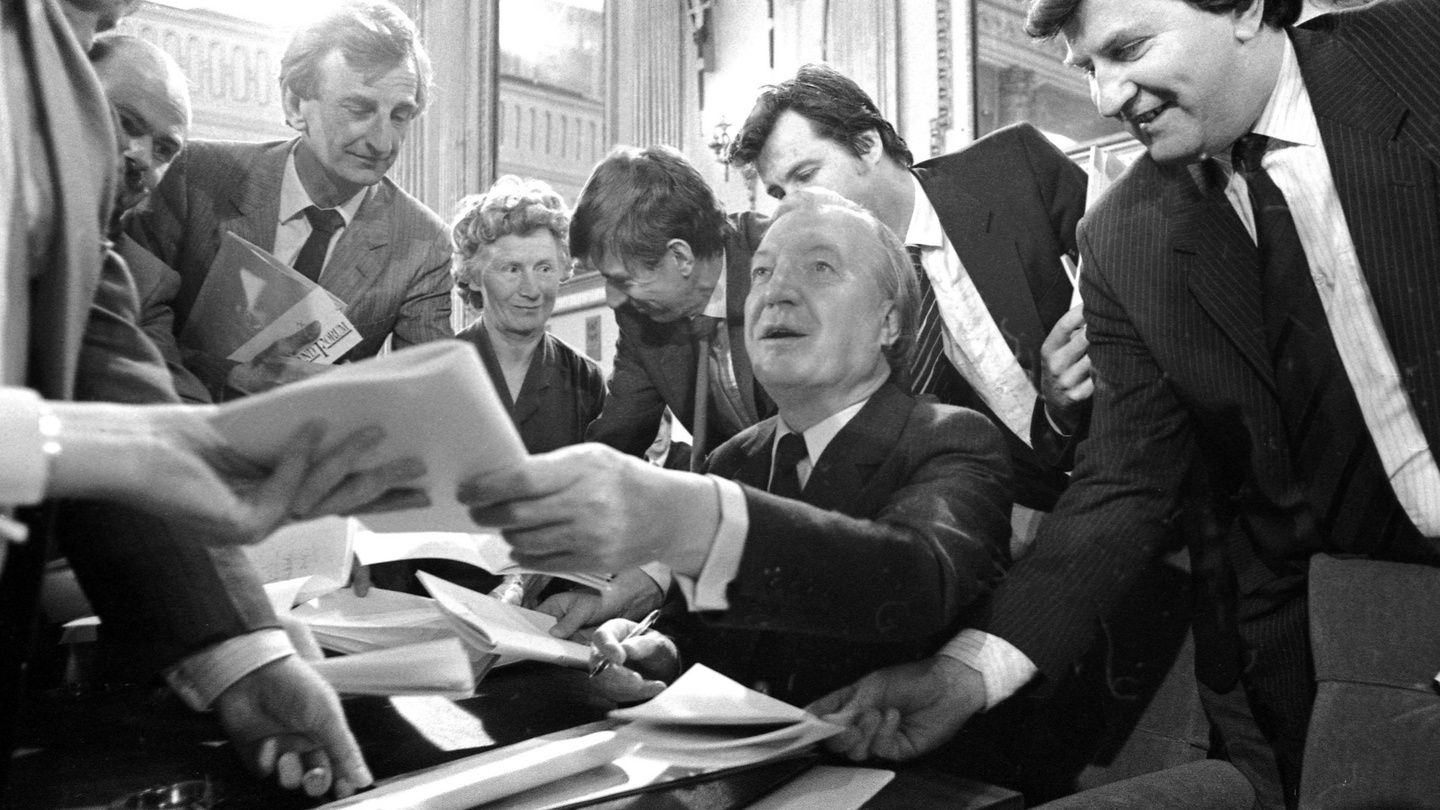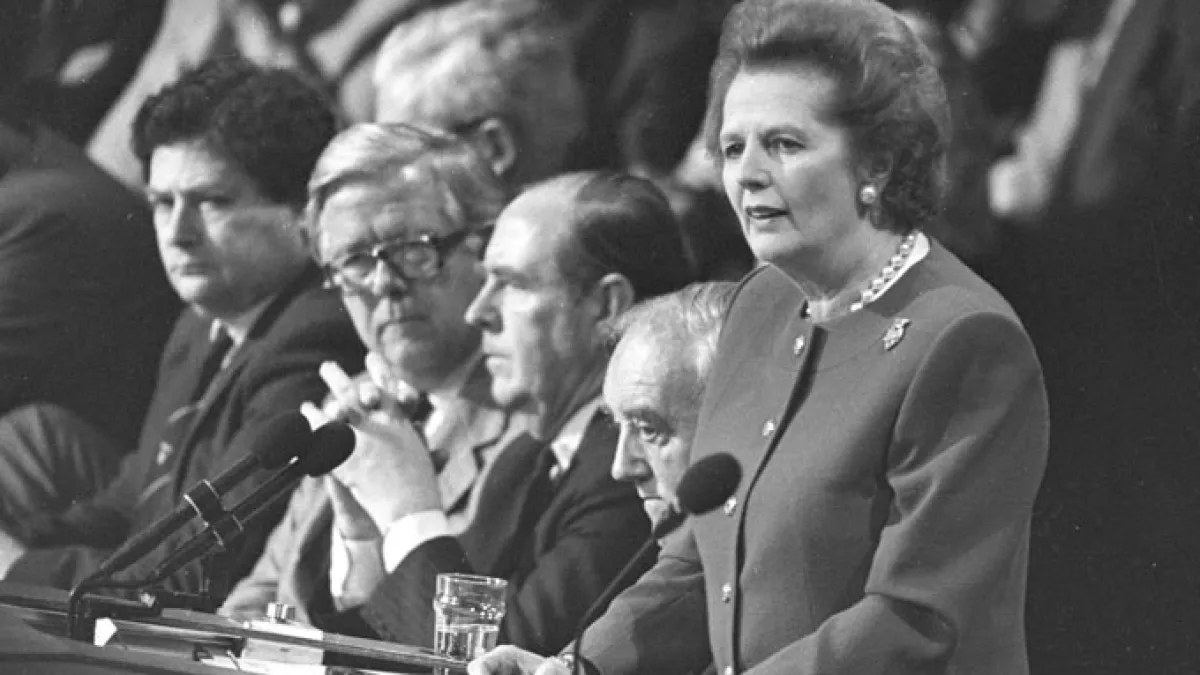Photo AI
Last Updated Sep 27, 2025
The New Ireland Forum and the Reaction & Key Questions Simplified Revision Notes for Leaving Cert History
Revision notes with simplified explanations to understand The New Ireland Forum and the Reaction & Key Questions quickly and effectively.
204+ students studying
The New Ireland Forum and the Reaction
Re-establishing the Assembly
- Following the 1980 and 1981 hunger strikes, new efforts were made to address the political situation in Northern Ireland.
- In 1982, the newly appointed Secretary of State for Northern Ireland, James Prior, introduced a White Paper titled Northern Ireland: A Framework for Devolution.
- This document proposed the establishment of a 78-seat assembly in Northern Ireland, with the aim of creating a new political body that would offer some degree of self-governance.
- The plan included the concept of rolling devolution, meaning that powers would be gradually transferred to the assembly as it proved capable of handling them.
- Elections for the new assembly were held in October 1982. The Ulster Unionist Party (UUP) and the Democratic Unionist Party (DUP) won the majority of seats, with 47 between them.
- Sinn Féin entered the election for the first time, winning five seats, while the Social Democratic and Labour Party (SDLP) secured 14, and the Alliance Party took 10 seats.
- However, the assembly struggled to gain real power. Subsequent political developments, including the 1985 Anglo-Irish Agreement, led to Sinn Féin and the SDLP refusing to take their seats in protest of the assembly's lack of effectiveness.

- However, the assembly struggled to gain real power. Subsequent political developments, including the 1985 Anglo-Irish Agreement, led to Sinn Féin and the SDLP refusing to take their seats in protest of the assembly's lack of effectiveness.
- The assembly was eventually dissolved in 1986, having failed to make significant progress. During this period, Sinn Féin began pursuing a new political strategy aimed at showing that constitutional politics could yield tangible results for nationalists.
The New Ireland Forum
- In 1983, the Republic of Ireland's new Taoiseach, Garret FitzGerald of Fine Gael, launched an initiative called the New Ireland Forum (NIF).
- The Forum aimed to bring together Ireland's main political parties—Fine Gael, Fianna Fáil, and Labour—alongside the SDLP to discuss potential solutions to the conflict in Northern Ireland. John Hume played a vital role in these talks, which took place almost 100 times in both public and private settings.
- The discussions sought to explore a wide range of recommendations, with many individual unionists also participating.
- On 2 May 1984, the Forum published its final report, which outlined several possible political solutions for the future of Northern Ireland.
- The report acknowledged both the unionist identity and the concerns they had about a united Ireland. The Forum's recommendations included three main options:

The New Ireland Forum's Proposals
The New Ireland Forum culminated in a report released in May 1984, which outlined three potential frameworks for resolving the conflict in Northern Ireland and achieving peace. These proposals were:
- A Unitary State: This option proposed the creation of a single Irish state, including all 32 counties. The Forum argued that a unitary state could provide the most straightforward solution, with one government overseeing the entire island of Ireland. This proposal was aligned with the long-standing aspiration of Irish nationalists for a united Ireland. However, the Forum also recognised that this option would require the consent of the unionist population in Northern Ireland, which was unlikely given their strong opposition to leaving the United Kingdom.
- A Federal or Confederal State: The second option proposed a federal or confederal arrangement in which Northern Ireland and the Republic of Ireland would each maintain their own governments but would be linked through a shared framework, possibly including a common constitution. This model was seen as a compromise that could allow for cooperation between the two jurisdictions while respecting the distinct identities and allegiances of their populations. The federal model would provide Northern Ireland with significant autonomy while fostering closer ties with the Republic of Ireland.
- Joint Authority: The third proposal suggested that the British and Irish governments jointly govern Northern Ireland. This joint authority would involve both governments sharing responsibility for Northern Ireland's affairs, potentially with the creation of new institutions to facilitate cooperation. This option was seen as a way to balance the interests of both unionists and nationalists, as it would involve both the British and Irish states in the governance of Northern Ireland.
Unionist Reaction to the New Ireland Forum
- The New Ireland Forum's proposals were met with strong opposition from the unionist community in Northern Ireland.
- Unionists viewed the Forum with suspicion, believing that it was an attempt by Irish nationalists to pressure the British government into making concessions that would undermine Northern Ireland's status within the United Kingdom.
- Unionist leaders were particularly hostile to the idea of a unitary state, which they saw as a direct threat to their British identity and their desire to remain part of the United Kingdom.
- Unionists were also critical of the idea of joint authority, as they feared it would weaken British sovereignty over Northern Ireland and give the Republic of Ireland undue influence over Northern Irish affairs.
- The proposals for a federal or confederal arrangement were similarly dismissed, as unionists were wary of any arrangement that would involve closer ties with the Republic of Ireland.
- In the wake of the Forum's report, unionist politicians refused to engage with the Forum's recommendations, and there was little support within the unionist community for any of the proposed solutions.
- The Forum's failure to gain unionist buy-in highlighted the deep divisions within Northern Ireland and the challenges of finding a solution that could satisfy both unionists and nationalists.
Margaret Thatcher's Response to the New Ireland Forum
-
British Prime Minister Margaret Thatcher's response to the New Ireland Forum was famously dismissive and underscored her government's firm stance on Northern Ireland's constitutional status.
-
During a press conference on 19 November 1984, when asked about the Forum's proposals, Thatcher responded with the now-iconic phrase, "That is out. Out. Out," indicating her rejection of all three options outlined in the Forum's report.
- Thatcher's rejection was rooted in her belief that Northern Ireland was an integral part of the United Kingdom and that any change in its status could only occur with the consent of its people, the majority of whom were unionists who wished to remain British.

- Thatcher's rejection was rooted in her belief that Northern Ireland was an integral part of the United Kingdom and that any change in its status could only occur with the consent of its people, the majority of whom were unionists who wished to remain British.
-
She saw the Forum's proposals as an attempt to undermine Northern Ireland's position within the UK and was unwilling to consider any arrangement that would dilute British sovereignty.
-
Thatcher's firm stance was met with disappointment and frustration among Irish nationalists, who saw it as a missed opportunity for dialogue and compromise.
-
Her rejection of the Forum's proposals further strained relations between the British and Irish governments and underscored the challenges of finding a mutually acceptable solution to the conflict.
-
Despite this setback, the Forum's work laid the groundwork for future discussions and highlighted the need for a more inclusive approach to resolving the issues in Northern Ireland.
500K+ Students Use These Powerful Tools to Master The New Ireland Forum and the Reaction & Key Questions For their Leaving Cert Exams.
Enhance your understanding with flashcards, quizzes, and exams—designed to help you grasp key concepts, reinforce learning, and master any topic with confidence!
488 flashcards
Flashcards on The New Ireland Forum and the Reaction & Key Questions
Revise key concepts with interactive flashcards.
Try History Flashcards56 quizzes
Quizzes on The New Ireland Forum and the Reaction & Key Questions
Test your knowledge with fun and engaging quizzes.
Try History Quizzes29 questions
Exam questions on The New Ireland Forum and the Reaction & Key Questions
Boost your confidence with real exam questions.
Try History Questions27 exams created
Exam Builder on The New Ireland Forum and the Reaction & Key Questions
Create custom exams across topics for better practice!
Try History exam builder117 papers
Past Papers on The New Ireland Forum and the Reaction & Key Questions
Practice past papers to reinforce exam experience.
Try History Past PapersOther Revision Notes related to The New Ireland Forum and the Reaction & Key Questions you should explore
Discover More Revision Notes Related to The New Ireland Forum and the Reaction & Key Questions to Deepen Your Understanding and Improve Your Mastery
96%
114 rated
Stalemate and a search for peace 1974-84
Direct Rule and the Ulster Convention
286+ studying
188KViews96%
114 rated
Stalemate and a search for peace 1974-84
IRA Bombing Campaigns in Guildford and Birmingham
406+ studying
188KViews96%
114 rated
Stalemate and a search for peace 1974-84
Roy Mason - Peace in Northern Ireland?
265+ studying
185KViews96%
114 rated
Stalemate and a search for peace 1974-84
Political Developments in the Late 1970's
225+ studying
181KViews